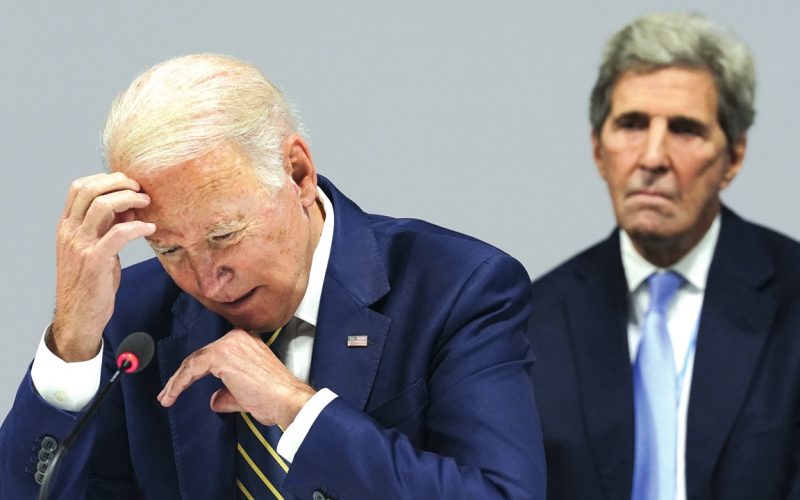During oral arguments Monday, the majority of Supreme Court justices did not appear prepared to rule that the Biden administration violated the First Amendment by urging social media platforms to limit speech.
In July 2023, a district court judge issued an initial injunction prohibiting officials from various agencies, including the Department of Health and Human Services (HHS) and the FBI, from using social media platforms to censor speech. The plaintiffs described the government’s actions as “the most massive attack against free speech in the United States’ history.” During oral arguments for the Biden administration’s appeal in Murthy v. Missouri, some justices were skeptical of the assessment.
“My biggest concern is that your view has the First Amendment hamstringing the government in significant ways in the most important time periods,” Justice Ketanji Brown Jackson told Louisiana Solicitor General Benjamin Aguinaga. “Some might say that the government actually has a duty to take steps to protect the citizens of this country.”‘
During litigation frequent meetings between federal agencies and platforms to address misinformation were disclosed in documents obtained by the plaintiffs, the states of Louisiana and Missouri, in addition to five individuals whose speech was censored. Email exchanges revealed the White House requested platforms to remove content “immediately” and terminate accounts.
The Fifth Circuit narrowed the injunction to prohibit a more limited group of agencies from “Coercing or Significantly Encouraging” the suppression or removal of speech, subsequent to the ruling of the district court in July of last year. The justices deliberated on the appropriateness of the line that would distinguish persuasion from coercion.
Justice Samuel Alito stated that he “cannot imagine” the government treating the print media similarly, regarding them as “subordinates.”
“Would you do that to the New York Times or the Wall Street Journal or the Associated Press?” he asked Principal Deputy Solicitor General Brian Fletcher. “Constant meetings, constant emails, we want answers, we’re partners, we’re on the same team — do you think the print media regards themselves as being on the same team as the federal government?”
“Potentially, in the context of the efforts to get Americans vaccinated during a once in a lifetime pandemic,” Fletcher said. “I really think that piece of context, it doesn’t change the First Amendment principles, but it’s relevant to how they apply here.”
Justice Brett Kavanaugh raised the same inquiry regarding the frequency with which press officials “berate” the media, citing the “anger” that is apparent in certain government communications.
Jackson and Justices Sonia Sotomayor and Elena Kagan were concerned, however, that this could impede the government’s ability to compel corporations to intervene when necessary, such as when a platform disseminates terrorist propaganda.
Furthermore, they cast doubt on the plaintiffs’ ability to establish that their posts were censored directly by the government and thus had standing.
This is the most horrifying thing I’ve ever heard from a Supreme Court Justice.
Ketanji Brown-Jackson is concerned that the First Amendment is making it harder for the government to censor speech.
That’s literally the entire point.pic.twitter.com/oqBwVZQB0l
— End Wokeness (@EndWokeness) March 18, 2024
“It seems like an extremely expansive argument,” Kagan said. “I’ve had some experience encouraging the press to suppress their own speech. You just wrote a bad editorial, here are the five reasons you shouldn’t write another one. You just wrote a story that’s filled with factual errors, here are the ten reasons why you shouldn’t do that again. This happens literally thousands of times a day in the federal government.”
Aguinaga pointed out that when the White House sends an email to Facebook requesting censorship of an individual’s post, the subject never sees that communication.
Jackson brought up a number of extraneous hypotheticals, such as asking if the government could demand that social media stop sharing posts about teenagers jumping out of windows.
Justice Amy Coney Barrett and Chief Justice John Roberts also grilled Aguinaga. Roberts said that while the federal government is not “monolithic,” various agencies may recommend distinct courses of action.
Barrett held out the possibility that the “encouragement” criterion would encompass an excessive number of activities. In the event the Louisiana government were to be doxxed, could the FBI contact social media companies to ask if the compromising information could be taken down?
“The government is not helpless,” Aguinaga said, while noting the solution to countering false speech is to encourage more true speech. “It has tools at its disposal and censorship has never been the default remedy.”

Originally published by the Daily Caller News Foundation

